|
|
|
Sort Order |
|
|
|
Items / Page
|
|
|
|
|
|
|
| Srl | Item |
| 1 |
ID:
138131
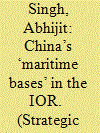

|
|
|
|
|
| Summary/Abstract |
After a successful visit by Prime Minister Narendra Modi to Colombo in March, Indian policy elite are hopeful that the new Sri Lankan government will roll-back some of the geopolitical concessions made by the Rajapaksa regime to Beijing, thereby restoring India’s primacy in its near neighbourhood. India’s policy elite are hopeful that Maithripala Sirisena, the new president, will roll back some of the geopolitical concessions made by his predecessor to Beijing, thereby restoring Indian primacy in its near neighbourhood.
New Delhi’s maritime analysts, however, remain a worried lot. Ever since a PLA-Navy (PLA-N) submarine docked twice in Colombo last year, Indian sea-power thinkers have been considering the prospect of a permanent Chinese naval presence in the Indian Ocean. Since November 2014, there have been strong rumours of a possible PLA-N base in the Indian Ocean Region (IOR). Media reports have indicated that Beijing was discussing a plan for multiple basing facilities in the Indian Ocean. An alarmed New Delhi even revived an old proposal for an Indian Ocean Zone of Peace—all in the hope that it would dissuade China from appropriating valuable space in its ‘strategic backyard’.
|
|
|
|
|
|
|
|
|
|
|
|
|
|
|
|
| 2 |
ID:
126124
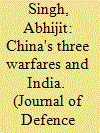

|
|
|
|
|
| Publication |
2013.
|
| Summary/Abstract |
For the past decade, China is known to have actively used 'three warfares' (3Ws) strategy-media, psychological and legal warfare-to weaken its adversaries in regions constituting what it perceives to be its 'core interests'. While a wide range of tools have been deployed, the attacks have remained mostly confined to Taiwan and South-East Asian states involved in the territorial disputes in the South China Sea. But with Beijing's influence in South Asia and the Indian Ocean Region (IOR) growing, there is evidence emerging of the 3Ws strategy being put to use against India. The evolving Chinese 3Ws strategy goes beyond mere propaganda wars and misinformation campaigns. Expanding conventional war dynamics into the political domain, the 3Ws appear aimed at undermining India's organizational foundations and target military morale. More disquietingly, the strategy appears designed to subdue India without even needing to fight.
|
|
|
|
|
|
|
|
|
|
|
|
|
|
|
|
| 3 |
ID:
136777
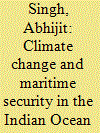

|
|
|
|
|
| Summary/Abstract |
Climate change is likely to influence maritime security in the Indian Ocean Region (IOR). The growing unpredictability in climate and weather patterns is having a disproportionate impact over the region. Not only is the IOR predicted to bear the brunt of future climatic changes, it is also likely to face strong constraints in meeting the coming threats. The effect of climate change on human security in the IOR is only likely to be matched by the impact of extreme weather conditions on naval operations and the security of maritime assets. This article argues that changing climate could take the form of a structural challenge that regional maritime forces will need to prepare systematically to tackle effectively.
|
|
|
|
|
|
|
|
|
|
|
|
|
|
|
|
| 4 |
ID:
102864
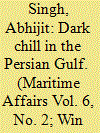

|
|
|
|
|
| Publication |
2010.
|
| Summary/Abstract |
This article reviews the sustained growth of Iran's naval forces in the past two decades. It closely examines the Islamic Republic's navy's war-waging capacity in the Persian Gulf, its new unconventional fighting philosophy, force imperatives, doctrinal underpinnings, combat objectives, and the implications that this might have on shipping and oil trade in the Persian Gulf. Experts have long speculated that Iran is developing its asymmetric capabilities aimed at paralysing the Persian Gulf and the eventual expansion of its sphere of influence. Interfering with the supply of oil would raise oil prices sharply and would certainly stall the still moderate global economic recovery, thereby plunging the world again into a global recession. Analysis shows that the modernisation of its naval forces might be the clearest indication that Iran may well be systematically developing the means to do so. This is brought home starkly by the beefing up of the Revolutionary Guards' Navy and its "swarming" capabilities. With a newfound assertiveness and aggressive tactics, the Iranian naval forces are now challenging the dominant force in the Persian Gulf - the US Navy. And even though the success of such an approach at this stage appears unlikely, they may still hold some key cards, to be able to pose a credible and effective threat.
|
|
|
|
|
|
|
|
|
|
|
|
|
|
|
|
| 5 |
ID:
182195
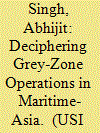

|
|
|
| 6 |
ID:
148427
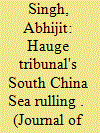

|
|
|
| 7 |
ID:
142480
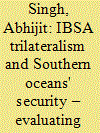

|
|
|
|
|
| Summary/Abstract |
The emergence of India–Brazil–South Africa (IBSA) as a key catalysing agent in the security affairs of the Global South is a development of deep political and strategic significance. Since 2008, the IBSA maritime exercises between India, Brazil and South Africa have played a critical security role in the South Atlantic–Southern Indian Ocean theatre, providing a foundation for a broader, more comprehensive regional initiative. The Southern oceanic littorals, however, do need not just need protection against non-traditional threats, but also a workable model of ocean governance that can revive ‘maritime development’ by kick-starting the regional marine economy and reinvigorating the civilian maritime sector. Doing so will require robust contribution from India, whose maritime agencies are well-placed to play an important security and capacity building role.
|
|
|
|
|
|
|
|
|
|
|
|
|
|
|
|
| 8 |
ID:
140955
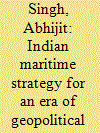

|
|
|
|
|
| Summary/Abstract |
The fractious nature of maritime relations in the Asia-Pacific region is a recognisable feature of international geopolitics today. Following China’s massive reclamation and ‘island-building’ project in the South China Sea recently, many Pacific states have moved to bolster their maritime postures. While Japan has sought legislative amendments to liberate its maritime posture from post-war passivism, Vietnam and the Philippines have been building stronger navies aimed at countering China’s hostile moves in the South China Sea. Meanwhile, Indonesia has sought to renew its capabilities as a maritime power through a new ‘maritime axis’ strategy, while Australia has boldly advocated an ‘Indo-Pacific’ framework for joint security endeavours and the creation of ‘middle-power coalitions’. In the interim, Russia has updated its maritime doctrine, announcing its military partnership with China as the cornerstone of its naval strategy in the Pacific.
|
|
|
|
|
|
|
|
|
|
|
|
|
|
|
|
| 9 |
ID:
120246
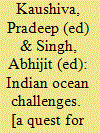

|
|
|
|
|
| Publication |
New Delhi, KW Publishers Pvt Ltd, 2013.
|
| Description |
xvii,168p.hbk
|
| Standard Number |
9789380502657
|
|
|
|
|
|
|
|
|
|
|
|
Copies: C:1/I:0,R:0,Q:0
Circulation
| Accession# | Call# | Current Location | Status | Policy | Location |
| 057271 | 355.033054/KAU 057271 | Main | On Shelf | General | |
|
|
|
|
| 10 |
ID:
133693
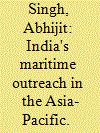

|
|
|
|
|
| Publication |
2014.
|
| Summary/Abstract |
In the past few years, New Delhi's drive to improve maritime relations with East and South East Asia has acquired a frisson of urgency. India's "Look-East" Policy, a largely trade and commerce oriented framework guiding interactions with nations to lndia's East, has now acquired a prominent nautical edge. With increased maritime forays and a clear articulation by the political leadership, ofthe principle of "freedom of navigation" and an "open and inclusive" architecture of global maritime security, New Delhi has shown it is inclined to treat the Western Pacific as a theatre of commercial and maritime security interests.
|
|
|
|
|
|
|
|
|
|
|
|
|
|
|
|
| 11 |
ID:
142811
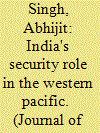

|
|
|
| 12 |
ID:
128116


|
|
|
|
|
| Publication |
2013.
|
| Summary/Abstract |
In the ongoing struggle for influence over Central Asia, Iran has positioned itself as a regional heavy-weight, and a player with considerable strategic leverage. Tehran's influence over its neighbourhood has been growing, even as its geo-political role has witnessed a significant expansion. While Tehran has always prided itself on its political sway over its neighbourhood, it involvement in Central Asian politics had, in the past, been curtailed by Western sanctions over its nuclear program
|
|
|
|
|
|
|
|
|
|
|
|
|
|
|
|
| 13 |
ID:
106865
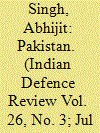

|
|
|
| 14 |
ID:
105529
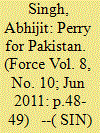

|
|
|
| 15 |
ID:
165579
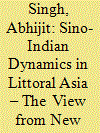

|
|
|
|
|
| Summary/Abstract |
China’s growing stakes in the Indian Ocean, in particular the People’s Liberation Army Navy’s (PLAN) expanding profile in South Asia, has caused deep concern in India, where many believe Chinese naval deployments have shrunk New Delhi’s traditional sphere of influence. China’s inroads in India’s strategic backwaters— in particular, growing PLAN submarine forays—are viewed with suspicion in New Delhi, where many are convinced of the need for a counter-China strategy. As India watches China expand its Belt and Road projects in the Indian Ocean bolstering sway over geopolitically significant island and coastal states, New Delhi faces a dilemma in its neighbourhood.
|
|
|
|
|
|
|
|
|
|
|
|
|
|
|
|
|
|
|
|
|